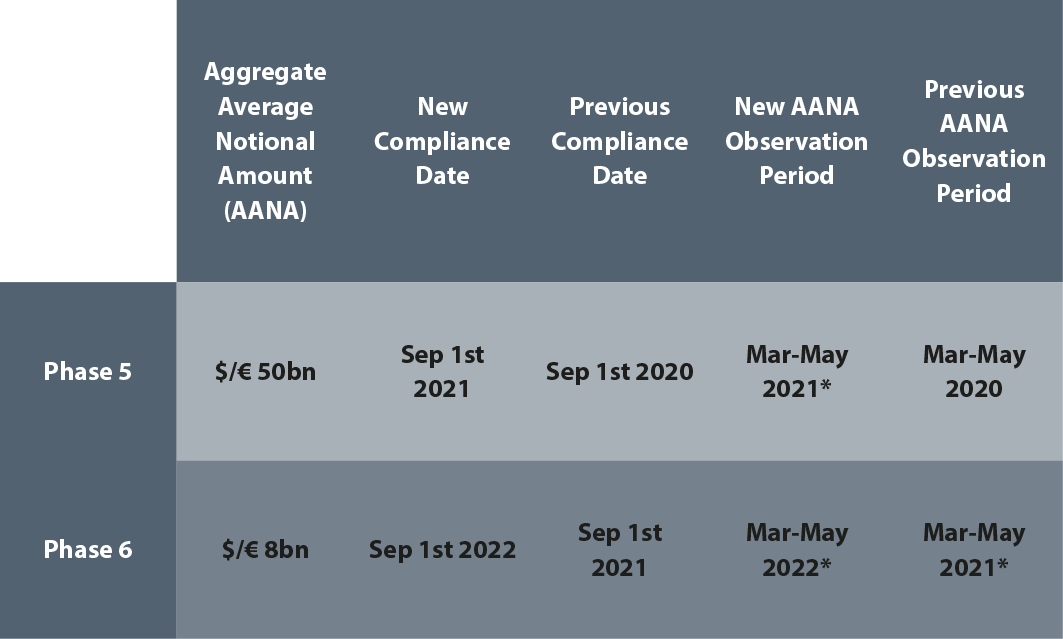On 3 April, Basel Committee on Banking Supervision (BCBS) and the International Organization of Securities Commissions (IOSCO) announced a one-year extension to the final implementation phases of the Uncleared Margin Rules (UMR), citing the ongoing market disruption across the globe resulting from COVID-19.
While the proposed new timeline still requires formal regulatory approval from local regulators, many have been quick to act already. Indeed, the Monetary Authority of Singapore (MAS) acted within days to confirm they will update their timeline, noting firms ‘would be hard pressed’ to make the necessary operational adjustments required for implementation, which was promptly followed by confirmation of plans to follow suit by many other national regulators, including the European Supervisory Authorities (ESA), Japan Financial Services Agency (JFSA), Swiss Financial Market Supervisory Authority (FINMA), Canadian Office of the Superintendent of Financial Institutions (OSFI) and Australian Prudential Regulation Authority (APRA). Given the scale of market disruption, regulators have been pro-active and amenable in accommodating changes that allow markets to function smoothly at this time.
The proposed new compliance timeline

*Dates subject to US regulatory confirmation (otherwise June to August 2020/21 for firms subject to US rules)
While in-scope firms breathe a collective sigh of relief, they are now faced with a dilemma – namely, continue with their analysis and planning as they were before the announcement or put their plans on hold. There is no simple answer and while some firms may feel they have invested too much to stop now, others may be facing a bigger impact arising from market disruption and instead prefer to divert resources to focus on maintenance of business as usual.
TriOptima insight
Since the delay was announced, initial discussions with phase 5 clients indicate a general consensus to plough ahead with project planning, albeit while working towards the revised 2021 date. Given firms were just 6 months from the phase 5 compliance deadline before the announcement, many feel they have already invested too much time and resources to risk valuable loss of momentum and knowledge. Instead, they indicate a preference to continue the analysis of the changes required to deliver IM compliance: including the selection of IM model; analysis of custody models; review and selection of vendor offerings etc.
This approach recognises that stopping and re-starting a project may in itself be a costly option, and significantly, allows firms more time for testing of IM calculations with vendor partners. While the extended timeline gives phase 6 firms an even longer lead time, and perhaps more justification to put projects on hold, many also talk about concluding on-going analysis in order to make things easier when they pick these projects up in 2021.
With more than 2,000 firms in our client network, TriOptima is well positioned to observe at first hand the impact of ongoing market volatility and disruption. Over the past month, triResolve has seen record trade volumes submitted for reconciliation, while triResolve Margin has seen a near tripling of margin call volumes during Q1. That margin call volumes should spike during a period of market stress is, of course, no surprise - how firms react to the associated pressures is key.
What to do with the extra time?
While the industry may broadly welcome the deadline extension, allowing firms more time to consider plans for IM compliance, the immediate focus for firms is on using this time to maintain operational capacity during these unprecedented times. For forward-thinking firms, this focus should be not simply on getting by, but should also include a review of existing processes to ensure they are best suited to handle the ‘new normal’. Hence firms should use this extra time to assess their processes – first for Variation Margin, but also recognising that market volatility reaffirms the importance of portfolio reconciliation - ensuring systems and processes for each are able to cope with increased volumes and a higher focus on dispute resolution. Improving current processes can ease immediate day to day pressures, but also help to lay a more solid foundation upon which to deliver IM compliance.
In order to both reduce risk and solve operational bottle-necks firms should consider prioritising the following steps:
Improve automation within existing VM margin process - this should include:
i. Switching from the use of email for call exchange to use of industry-standard messaging protocols such as MarginSphere
ii. Adoption of a robust automated margin workflow
iii. Connectivity to SWIFT payments system to ensure straight-through processing
Ensure the ability to seamlessly identify, quantify and resolve disputes
i. Integration of the margin and portfolio reconciliation flows to help firms achieve transparency across both portfolio and valuation differences
ii. Adoption of a dedicated dispute workflow to assist in the identification of root cause, dispute ageing and provide necessary management oversight
Adoption of the above can provide quick wins in the form of higher operational resilience and increased capacity. As recent market events have demonstrated, automation and the importance of moving away from manual processes are more critical than ever before.
Concluding thoughts
Firms granted this one-year reprieve should use their time wisely. For those who are in an advanced stage of UMR planning, the revised timeline may provide them with an opportunity to conclude their projects as planned, allowing them to monitor IM from September 2020, thus gaining valuable insight into the likely impact of IM from September 2021 onwards. For others who are perhaps not at such an advanced stage, the extension provides greater opportunity for testing with, and due diligence of their vendor partners. For others still, the reprieve provides a much-needed opportunity to focus on other priorities outside of UMR.
Regardless of the approach firms take in relation to their UMR project – plough ahead or pause – all firms should use the additional time to improve their existing margin and portfolio reconciliation operations. Recent market volatility has placed legacy processes under unprecedented strain, firms should ensure they are best able to resist continuing market turmoil and future operational shocks.
To find out how TriOptima can help, click here.



